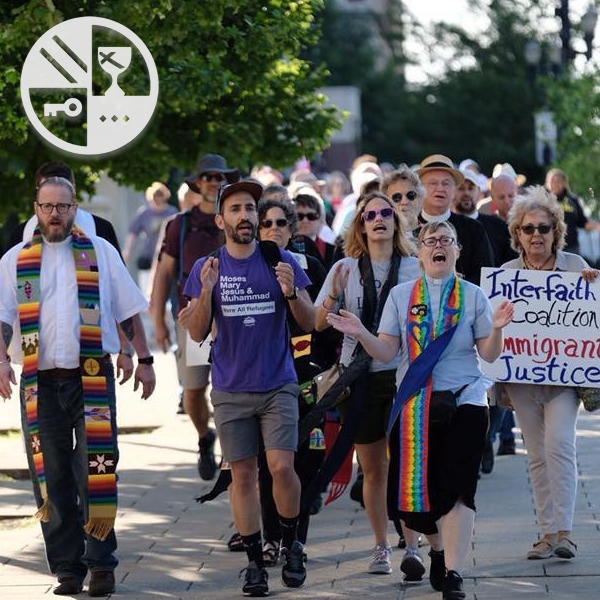For the Lord your God is God of gods and Lord of lords, the great God, mighty and awesome, who is not partial and takes no bribe, who executes justice for the orphan and the widow, and who loves the strangers, providing them with food and clothing. You shall also love the stranger, for you were strangers in the land of Egypt (Deuteronomy 10:17-19).
We all take things for granted. Navigating our world day-to-day requires a certain amount of taken-for-grantedness. I take for granted that when I give the cashier a little blue piece of plastic that I’ll be able to take my lima beans and Wonderbread and walk out of the Kroger unmolested.
I take for granted that when I go to Pizza Hut they’re not leavening the dough with Drano.
I take for granted that when this rally is over, I’ll get in my car to go home, and everyone else on the road will know to drive on the righthand side of the road.
Indeed, I take for granted that after this is over, I’ll have a home to go home to.
Most of us take for granted that home is a fixed place that’ll be there whenever we need it.
But not everybody in the world has a place they can call home. Because, I suspect, we all realize that home is more than an address with a few shrubs, a mailbox, and a toxic waste dump for your neighbor’s 200 lb. Mastiff.
There are some people who feel like the place they were born and learned to call home is no longer safe enough to be anything like a home. And so they pack up their children and they come here in the hopes of finding a new home and new neighbors—and if not a home then at least a place that will protect their children from the violence and death they’ve grown to expect in the places they come from.
But now?
What happens now with the “zero tolerance” policy is that families in search of a home are torn apart. This administration has decided that children are an acceptable price to pay to keep people of color from “invading” our country.
This administration has made the strategic calculation that it’s altogether acceptable to say to the parents of these children, as well as to intransigent bleeding heart liberals and progressives: “That’s a nice baby you’ve got there. It’d be a shame for something to happen to her.”
In just 6 weeks, thousands of children have been ripped from their parents’ arms. Doctors tell us this kind of trauma causes lifelong mental, emotional, and physical harm. And there’s still no plan to reunite these families, to restore to terrified parents and children the possibility of ever again finding a home together. The closest thing the folks in charge have got is locking up families in the same facility.
But that’s not putting families back together; it’s just crushing them in a new, more deniably evil way.
You see, home is where people welcome you . . . often when you’ve got no place else to go. In the world of the Bible not to have a home was to be vulnerable to violence and exploitation. Those who were most vulnerable because they often had no home were widows, orphans, and strangers.
In fact, more than any other commandment in the Hebrew Scriptures, the exhortation to care for widows, orphans, and strangers is more prominent than any other commandment . . . over three dozen times it’s in there. You can find it in the Law, in the Psalms, and in the Prophets.
God holds a special place in God’s heart for those who can’t find welcome in this world, a home for those whose homes can no longer welcome them. A place to belong, a place where hospitality is extended.
As a person of faith, I have a vested interest in the issue of hospitality, of extending the hand of welcome.
In our culture, we tend to believe that hospitality has to do with things like potato salad and chicken casserole. But when people of faith talk about about hospitality, we’ve got our sights set on bigger things. Because cultivating hospitality is about having a disposition, an attitude of openness, which asks first about how to serve and embrace others—regardless of what the folks in charge think about it.
And if I’m being honest, I’m baffled by white evangelicals who think this president is a champion for Christian values. He hasn’t done anything that if the Jesus they claim to follow showed up on the scene would cause him to say, “Yeah, nice job! That’s totally what I had in mind.”
People of faith have got to do better—Hindus, Buddhists, Jews, Muslims, Christians. All of us, people of faith and people of no particular faith . . . we bear responsibility for the treatment of widows, orphans, and strangers. And we can’t sit idly by while innocent people, people just searching for a home under the banner of our protection are thrown in cages.
We’ve got to join our voices together to tell the government “No! You’re not going to continue to commit atrocities against people of color in our name—just to score political points with racists and white nationalists! We will not allow it!”
Because don’t kid yourself, you start welcoming the stranger to make a home among us, speaking up on behalf of the undocumented and those fleeing violence, you start advocating for sanctuary for those oppressed by the government . . . you’re going to make the big shots in Frankfort and Washington nervous.
But maybe what we need most right now is some nervous politicians, politicians scared of our outrage, afraid of what we’re capable of doing in the name of justice and love.
When we talk about welcome, about hospitality, we’re not concerned with drawing boundary lines to indicate just who deserves it; we’re interested in blowing open the doors and welcoming everybody in. To the people usually on the outside of polite society with their noses pressed up against the glass wishing someone would welcome them—we say, "Let 'em all in. Don't cross-reference the guest list; don't check I.D.s at the door, don't ask for the password and the secret handshake, don’t make sure they’re the right color. Look them in the eyes, embrace them, and say, ‘Welcome home.’”
Because the real question to those of us who care about our neighbors is:
Are we willing to love the wrong people hard enough to make the folks in charge nervous?




















